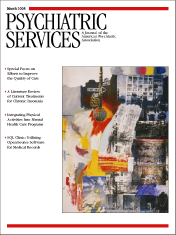HMOs' Restrictions on Clinical Practice
In Reply: We thank Dr. Wilf for his letter and for the opportunity to clarify some points.
All of the clinicians on Pennsylvania's southeast regional pharmacy and therapeutics committee that we described in our column are practicing community psychiatrists. The Pennsylvania Department of Public Welfare has promoted access to medications for medical-assistance patients. The three Medicaid HMOs currently have all the SSRIs on their formularies, although not all forms of each medication are represented. No HMO restricts prescribing a new antipsychotic or antidepressant when one has been discontinued, unless it is not on the formulary. Recently, AmeriChoice added aripiprazole to its formulary, as the other HMOs have done. Only Keystone Mercy requires that a clinician obtain prior authorization when adding a second atypical antipsychotic. AmeriChoice allows a 60-day crossover period for any therapeutic duplication and requires prior authorization if the prescribing period for the two medications goes beyond this period.
The three HMOs employ dosing guidelines, generally following limits described in the PDR. Dosing strategies are not restricted, although simple dosing schedules are encouraged. There are, however, many steps when errors may occur. Pharmacies occasionally tell patients erroneously that certain prescriptions cannot be filled. Prescribers should be notified, but rarely are, at the time these denials occur. Physicians and pharmacists must inform the HMOs and Community Behavioral Health when prescribing guidelines are not being upheld.
Treatment of some patients with refractory illness requires unusual regimens, but the use of multiple antipsychotics is potentially problematic. Dr. Wilf describes a patient whose hallucinations abated after the addition of a second atypical antipsychotic. At what point would he consider decreasing the first antipsychotic? Although few empirical data exist on the use of multiple antipsychotics, evidence of the metabolic complications of these drugs is increasing. Such effects may increase with the number of medications used. Additionally, it is unclear why it is preferable to use two atypical antipsychotics rather than clozapine, as recommended in algorithms for the treatment of schizophrenia such as the Texas Medication Algorithm Project (1).
Changing from one HMO to another if medications are not available is neither a practical nor a constructive solution. Many patients choose their HMO based on which doctors they are able to see or on coverage for nonpsychiatric problems. Patients who have been taking psychotropics that have become generic may be "grandfathered in" to continue receiving the brand medications on which they have been stabilized. A patient who changes HMOs would no longer have the same medication history with the new HMO and would require a prior authorization to obtain the brand medication. Changes in pharmacy benefits should come from dialogue with the HMOs, not from manipulating the system at any moment to suit ones needs.
Our article advocates a single formulary for all three HMOs in an effort to decrease obstacles to prescribing. While a single-payer system for medical assistance is the logical extension of this argument, the issue is much larger. The committee struggles with balancing patients' needs for access to medications with cost containment. The uniform prior authorization form is an effort to strike this balance. HMOs don't restrict who contacts them or how they are contacted for prior authorization. They do require clinical justification. Clinicians must inform the HMOs and Community Behavioral Health regarding their experiences with this process so the problems will be discussed in the committee. If patients are to have access to care, then clinicians must take responsibility for thoughtful and persistent advocacy on their behalf.
1. Miller AL, Chiles JA, Chiles JK, et al: The Texas Medication Algorithm Project (TMAP) schizophrenia algorithms. Journal of Clinical Psychiatry 60:649–657, 1999Crossref, Medline, Google Scholar



